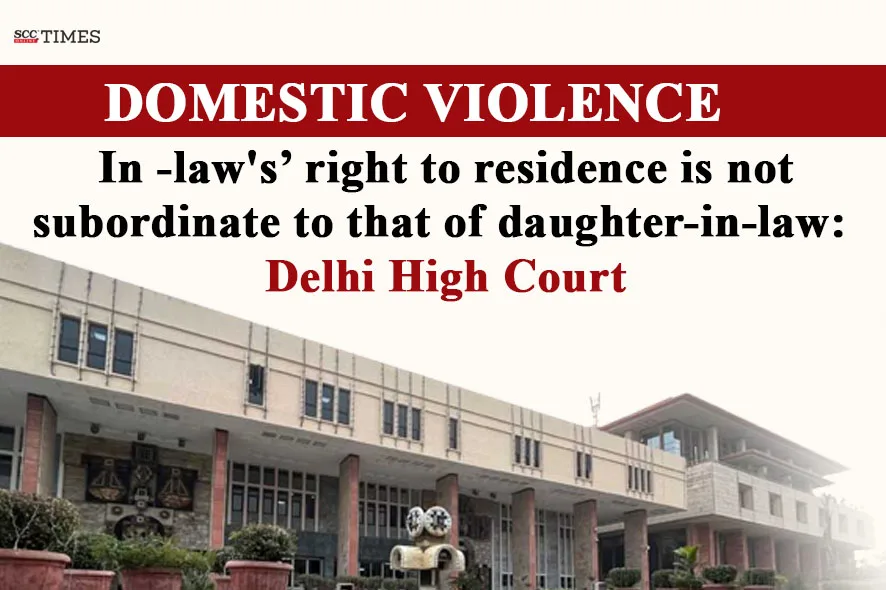Delhi High Court: In an appeal filed by the daughter-in-law challenging the judgment passed by the Single Judge whereby the parents-in-law, who were senior citizens, were granted a decree of mandatory injunction directing her to vacate the property while providing alternate accommodation in terms of Section 19(1)(f) of the Protection of Women from Domestic Violence Act, 2005 (‘Domestic Violence Act’), the Division Bench of Anil Kshetarpal* and Harish Vaidyanathan, JJ., upheld the judgement and stated that the senior citizens’ right to live peacefully with dignity in their own home could not be subordinated to the residence right of the daughter-in-law.
Accordingly, the Court dismissed the appeal and stated that the right of residence was meant to ensure safety and stability, not to perpetuate the occupation of a large family home at the cost of the lawful owners.
Background
The parents-in-law were the owners of the said property which they purchased with their own funds, and the daughter-in-law was residing therein after her marriage with their son. The matrimonial relationship between the two was admittedly strained, which resulted in frequent quarrels and police complaints. Multiple proceedings under the Domestic Violence Act and other statutes were pending between them.
The parents-in-law alleged that continued cohabitation of all family members under one roof, sharing common spaces such as kitchen, living areas, and entry, had become unbearable and detrimental to their health, peace, and dignity. They instituted a civil suit seeking permanent injunction against the daughter-in-law regarding her eviction from the said property and expressed willingness to provide alternate accommodation to her. The Single Judge decreed the suit and directed the parents-in-law to provide her with alternate accommodation consisting of a three-bedroom house on an equivalent plot, with rent up to Rs 65,000 per month.
The daughter-in-law contended that she possessed a statutory right of residence which could not be divested by way of a civil court decree. She further argued that the arrangement of alternate accommodation under Section 19(1)(f) of the Domestic Violence Act was contemplated only as an exceptional measure, not as a substitute for the right to reside in the shared household.
Analysis and Decision
The Court stated that the issue involved in the case at hand was whether senior citizens, being the absolute owners of their self-acquired property, were entitled to live peacefully with dignity therein, particularly when adequate steps had been taken to protect the residential rights of the daughter-in-law under the Domestic Violence Act?
The Court observed that the parents-in-law, being the undisputed owners of the said property purchased from their own funds, were entitled to possession thereof, while the daughter-in-law, was residing in the property merely by virtue of her marriage to their son. Due to the issues in the matrimonial relationship and the existence of multiple legal proceedings between the family members, the Court noted that continued cohabitation under one roof had become wholly impracticable for peaceful living.
Considering Sections 2(s) and 17 of the Domestic Violence Act, the Court stated that the right of residence conferred upon an aggrieved woman under the Domestic Violence Act was a right of occupation and not ownership and thus, was not indefeasible. Such a right was intended to prevent destitution and homelessness but should be balanced against the rights of senior citizens who were lawful owners in possession of the property. The Court emphasized that this right did not mean a perpetual right to reside on the same premises, and it could be satisfied by providing suitable alternative accommodation under Section 19(1)(f) of the Domestic Violence Act.
The Court noted that in the present case, the parents-in-law had offered to provide the daughter-in-law with alternate accommodation consisting of a two-bedroom flat in a comparable locality with rent up to Rs. 65,000 per month, along with the payment of security deposit, maintenance, brokerage, electricity, and water charges. The Court observed that this arrangement was fair, reasonable, and consistent with the object of the Domestic Violence Act. The Court highlighted that the Domestic Violence Act guaranteed adequacy of residence, not parity of luxury, and held that the daughter-in-law’s contention seeking identical accommodation was misconceived. Further, the Court opined that the right of residence was meant to ensure safety and stability, not to perpetuate the occupation of a large family home at the cost of the lawful owners.
The Court observed that the daughter-in-law was already receiving maintenance in separate proceedings, and when viewed cumulatively with the offered accommodation, her statutory right of residence stood fully safeguarded. The Court held that the senior citizens’ right to live peacefully with dignity in their own home could not be subordinated to the residence right of the daughter-in-law. The Court opined that where both sets of rights intersected, the Court should strike a delicate balance so that neither party’s dignity nor security got compromised.
Thus, the Court upheld the Single Judge’s judgment and directed the parents-in-law to identify and offer alternate accommodation within four weeks. Further, the Court directed the daughter-in-law to vacate the premises within two weeks thereafter.
The Court, accordingly, dismissed the appeal and stated that while the Domestic Violence Act conferred a vital and protective right of residence upon an aggrieved woman, it could not be construed to extinguish or indefinitely suspend the right of senior citizens to live without distress in their own home. The law should operate in a manner that preserved both safety and serenity, particularly in cases where multiple generations coexisted under the same roof, and familial relationships had irretrievably broken down.
[Manju Arora v. Neelam Arora, 2025 SCC OnLine Del 7280, decided on 30-10-2025]
*Judgement authored by Justice Anil Kshetarpal
Advocates who appeared in this case:
For the Daughter-in-law: Prabhjit Jauhar, Shreya Narayan and Anupama Kaul, Advs.
For the Respondent: Preeti Singh, Sunklan Porwal, Anuradha Anand, Kirti Dhaiya, Sakshi Trivedi and Akshay Chabra, Advs.


